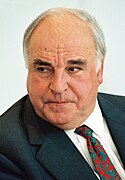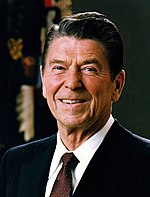11th G7 summit
| 11th G7 summit | |
|---|---|
 Schaumburg Palace in Bonn | |
| Host country | West Germany |
| Dates | May 2–4, 1985 |
| Venue(s) | Palais Schaumburg |
| Cities | Bonn, North Rhine-Westphalia |
| Follows | 10th G7 summit |
| Precedes | 12th G7 summit |
The 11th G7 Summit was held in Bonn, West Germany between May 2 and May 4, 1985. The venue for the summit meeting was at the former official residence of the Chancellor of the Federal Republic of Germany in Bonn, the Palais Schaumburg.[1]
The Group of Seven (G7) was an unofficial forum which brought together the heads of the richest industrialized countries: France, West Germany, Italy, Japan, the United Kingdom, the United States, Canada (since 1976),[2] and the President of the European Commission (starting officially in 1981).[3] The summits were not meant to be linked formally with wider international institutions; and in fact, a mild rebellion against the stiff formality of other international meetings was a part of the genesis of cooperation between France's president Valéry Giscard d'Estaing and West Germany's chancellor Helmut Schmidt as they conceived the first Group of Six (G6) summit in 1975.[4]
Leaders at the summit
[edit]
The G7 is an unofficial annual forum for the leaders of Canada, the European Commission, France, Germany, Italy, Japan, the United Kingdom and the United States.[3]
The 11th G7 summit was the first summit for Canadian Prime Minister Brian Mulroney.
Participants
[edit]These summit participants are the current "core members" of the international forum:[5][1][6]
| Core G7 members Host state and leader are shown in bold text. | |||
| Member | Represented by | Title | |
|---|---|---|---|
| Canada | Brian Mulroney | Prime Minister | |
| France | François Mitterrand | President | |
| West Germany | Helmut Kohl | Chancellor | |
| Italy | Bettino Craxi | Prime Minister | |
| Japan | Yasuhiro Nakasone | Prime Minister | |
| United Kingdom | Margaret Thatcher | Prime Minister | |
| United States | Ronald Reagan | President | |
| European Community | Jacques Delors | Commission President | |
| Bettino Craxi | Council President | ||
Issues
[edit]The summit was intended as a venue for resolving differences among its members. As a practical matter, the summit was also conceived as an opportunity for its members to give each other mutual encouragement in the face of difficult economic decisions.[4] Issues which were discussed at this summit included:
- Growth and Employment
- Relations with Developing Countries
- Multilateral Trading System and International Monetary System
- Environment Policies
- Cooperation in Science and Technology
Gallery of participating leaders
[edit]Core G7 participants
[edit]See also
[edit]Notes
[edit]- ^ a b Japan, Ministry of Foreign Affairs (MOFA): Summit Meetings in the Past.. Accessed 2009-03-11. Archived 2009-04-29.
- ^ Saunders, Doug. "Weight of the world too heavy for G8 shoulders," Archived 2008-10-11 at the Wayback Machine Globe and Mail (Toronto). July 5, 2008 -- n.b., the G7 becomes the Group of Eight (G7) with the inclusion of Russia starting in 1997.
- ^ a b Reuters: "Factbox: The Group of Eight: what is it?", July 3, 2008.
- ^ a b Reinalda, Bob and Bertjan Verbeek. (1998). Autonomous Policy Making by International Organizations, p. 205.
- ^ Rieffel, Lex. "Regional Voices in Global Governance: Looking to 2010 (Part IV)," Archived June 3, 2010, at the Wayback Machine Brookings. March 27, 2009; "core" members (Muskoka 2010 G-8, official site). Archived June 2, 2010, at the Wayback Machine
- ^ MOFA: Summit (11); European Union: "EU and the G8" Archived 2007-02-26 at the Wayback Machine
References
[edit]- Bayne, Nicholas and Robert D. Putnam. (2000). Hanging in There: The G7 and G8 Summit in Maturity and Renewal. Aldershot, Hampshire, England: Ashgate Publishing. ISBN 978-0-7546-1185-1; OCLC 43186692( Archived 2012-11-10 at the Wayback Machine 2009-04-29)
- Reinalda, Bob and Bertjan Verbeek. (1998). Autonomous Policy Making by International Organizations. London: Routledge. ISBN 978-0-415-16486-3; ISBN 978-0-203-45085-7; OCLC 39013643
External links
[edit]- No official website is created for any G7 summit prior to 1995 -- see the 21st G7 summit.
- University of Toronto: G8 Research Group, G8 Information Centre









